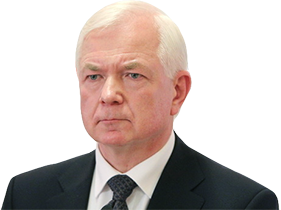After talking with Donald Trump and Angela Merkel, the Russian president has clearly come up with new ideas for settling the Donbas conflict. First and foremost, Vladimir Putin seeks to show that he is contributing to the peace process and that the leaders of the “LPR” and “DPR” are not Moscow’s direct henchmen but representatives of the local community. Therefore, Putin came up with this rotation idea to show that the "republics" are no more governed by those with blood on their hands but some other people, who have Ukrainian roots and enjoy trust on the part of the Donbas population.
It could seem that this would be a step toward some positive change. But in fact, the essence of things will not change a bit - only personas will. Surely, new “freshman” leaders will not be such odious figures as Zakharchenko or Plotnitsky.
Putin is trying to show that there are positive developments, both on personnel issues and security.
It is important for Putin to claim that he has fulfilled informal arrangements reached with the Americans and Germans to legitimize the authorities of the occupied areas by pulling out radical leaders who have been complicit in atrocities, commanded combat missions, etc. Putin is trying to "whitewash" the leaders of "LPR/DPR" and to have the region be represented by people who are still being trusted, and then on this basis, demand that Ukraine hold elections in the war-torn area. Moreover, he will be talking about elections observed by the "blue helmets", UN peacekeepers, to the deployment thereof he allegedly has no more objections.
Thus, Putin is trying to show that there are positive developments, both on personnel issues and security. And, of course, all these developments are taking place with the participation of Russia and the new militant leaders. Therefore, Russia will definitely try to make these new “Donbas leaders” participants in the negotiation process. After all, no one will any longer be able to brand them terrorists and blood-stained warlords of the "LPR" and "DPR" organizations.
This way, the Kremlin will begin to implement a model of its new policy, which I opine has been informally agreed with the U.S. administration and Germany’s Frau Merkel, who ahead of the upcoming elections seeks to show German voters that progress has been reached in resolving the Donbas issue, and that she managed to exert pressure on even on Mr Putin so that he not only takes part in negotiations but also takes up some concrete positive steps – “Donbas leadership” reshuffle and the introduction of a peacekeeping force.
Besides, by showing the whole world that the "republics" are ruled by Ukrainian natives, he will thus try “proving” his cynical point that both sides to the conflict in Donbas are Ukrainians. Moreover, on the part of the areas beyond the Ukrainian government control, they are people who were not involved in fighting and who can enjoy some level of trust.
From the outside, it will look like an actual process of peaceful settlement. However, the fact that the new leaders are the Kremlin’s henchmen will remain a concealed part not to be declared.
However, Russia will never withdraw from Donbas. In this situation, Moscow simulates the situation where leaders in eastern Ukraine are fully controlled by the Kremlin. Over some time, Putin hopes to have those leaders become part of the negotiation process and then to have the elections held under Russia's control, since he will never allow independent voting in this region.
Through Ukraine’s allies, first of all, through the Normandy Four and the U.S. administration, Russia will demand that Ukraine fulfill and agree on the political component of Minsk agreements, hold elections and set up local authorities in "LPR/DPR" from among the people who are either pro-Russian or are controlled from Moscow.
In other words, from the outside, it will look like an actual process of peaceful settlement. However, the fact that the new leaders are the Kremlin’s henchmen will remain a concealed part not to be declared.
At the same time, Ukraine in such a situation will have no serious arguments to disagree on the political part of the Minsk agreements. After all, Moscow will say: "Everything has been set – now it’s your turn to act!" Russia hopes that Germany, France, and the U.S. will support this position.
As for the figures who are likely to replace Zakharchenko and Plotnitsky - Bobkov and Volga – this is the Kremlin leadership who will both appoint and control them. I should note that this is only a possible option, not a final decision being considered here.
But if this option really is implemented, the format of the actions by Russia and its proxies in Donabs is likely to change to a more peaceful and loyal stage; that is, from the outside, their moves will appear less radical. On the other hand, this will entail a more intense pressure on Ukraine's leadership in the negotiation process and implementation of the political part of Minsk agreements. However, I emphasize that Russia’s goal remains the same - to keep under Moscow’s control the completely subordinate to and dependent on Moscow newly elected bodies of "LPR/DPR", originally appointed, and then "voted in" in the course of the election campaign. Of course, all candidates for local posts will only be offered from among people over whom Russia has actual influence.
So this is only Russia's first step toward implementing its great project. The Kremlin is changing the strategy to a more loyal one, while Moscow’s ultimate goal remains the same - to have totally controlled local authorities in Donbas.
Mykola Malomuzh is a former chief of Ukraine's Foreign Intelligence Service


